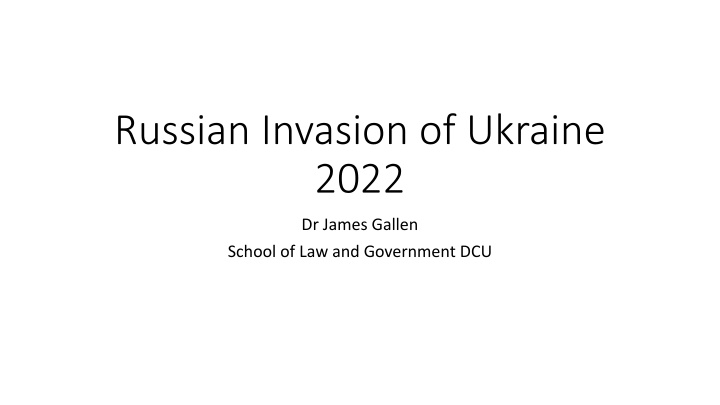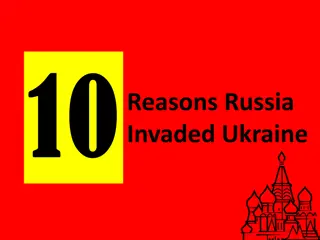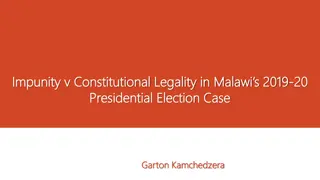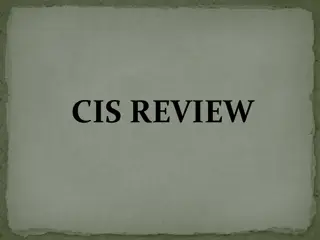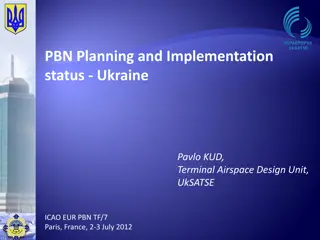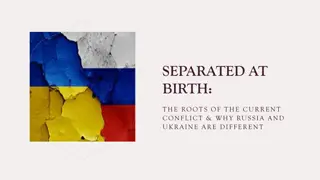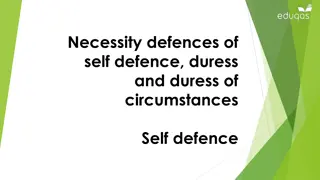Legality and Self-Defence in the Russian Invasion of Ukraine 2022
The Russian invasion of Ukraine in 2022 raises critical issues regarding the legality of the use of force under international humanitarian law and the United Nations Charter. The article discusses the prohibition on the use of force, the UN Security Council's role, and the right to self-defence under Article 51 of the UN Charter. It emphasizes Ukraine's legal right to defend itself and seek military assistance in the face of armed attack.
Download Presentation

Please find below an Image/Link to download the presentation.
The content on the website is provided AS IS for your information and personal use only. It may not be sold, licensed, or shared on other websites without obtaining consent from the author.If you encounter any issues during the download, it is possible that the publisher has removed the file from their server.
You are allowed to download the files provided on this website for personal or commercial use, subject to the condition that they are used lawfully. All files are the property of their respective owners.
The content on the website is provided AS IS for your information and personal use only. It may not be sold, licensed, or shared on other websites without obtaining consent from the author.
E N D
Presentation Transcript
Russian Invasion of Ukraine 2022 Dr James Gallen School of Law and Government DCU
Legality of the use of force International Humanitarian Law/Laws of War International Criminal Law There is both individual and State responsibility for aggression and for other international crimes in the conduct of armed conflict.
Legality of the Use of Force Prohibition on the Use of Force: United Nations Charter, Article 2(4): All Members shall refrain in their international relations from the threat or use of force against the territorial integrity or political independence of any state, or in any other manner inconsistent with the Purposes of the United Nations.
UN Security Council Composition: A23 UNSC has P5 (United States, UK, China, France and USSR/Russia) Article 24 of the UN Charter grants the Security Council primary responsibility for the maintenance of international peace and security . This includes taking collective measures to prevent and counter threats to peace and suppressing acts of aggression. A27 P5 members get a veto power on UNSC votes. Enforcement Powers: A41: The Security Council may decide what measures not involving the use of armed force are to be employed to give effect to its decisions, and it may call upon the Members of the United Nations to apply such measures. These may include complete or partial interruption of economic relations and of rail, sea, air, postal, telegraphic, radio, and other means of communication, and the severance of diplomatic relations. A42: Should the Security Council consider that measures provided for in Article 41 would be inadequate or have proved to be inadequate, it may take such action by air, sea, or land forces as may be necessary to maintain or restore international peace and security. Such action may include demonstrations, blockade, and other operations by air, sea, or land forces of Members of the United Nations.
Self-Defence Art. 51 Charter of the United Nations: Nothing in the present Charter shall impair the inherent right of individual or collective self-defence if an armed attack occurs against a Member of the United Nations, until the Security Council has taken measures necessary to maintain international peace and security. Measures taken by members in the exercise of this right of self-defence shall be immediately reported to the Security Council and shall not in any way affect the authority and responsibility of the Security Council under the present Charter to take at any time such action as it deems necessary in order to maintain or restore international peace and security, As a result Ukraine can legally use force to defend itself from attack, and moreover, can request military assistance from other countries.
UNSC Resolution Vetoed 25 February: Russia on Friday vetoed a U.N. Security Council resolution condemning the country's invasion of Ukraine. The Russian ambassador to the United Nations, Vassily Nebenzia, was the only person to vote against the resolution, with 11 countries voting in favor. As one of the five permanent members of the U.N. Security Council, Russia, along with China, France, Britain and the United States, have the power to veto any resolution regardless of its international support. Three countries -- China, India and the United Arab Emirates -- abstained from voting during the meeting in New York City.
UNGA Resolution ES-11/1 2 March: The UN General Assembly overwhelmingly adopted a resolution on Wednesday demanding that Russia immediately end its military operations in Ukraine. A total of 141 countries voted in favour of the resolution, which reaffirms Ukrainian sovereignty, independence and territorial integrity. The resolution demands that Russia immediately, completely and unconditionally withdraw all of its military forces from the territory of Ukraine within its internationally recognized borders.
Treaties and Laws of International Humanitarian Law/Laws of War Hague Conventions Geneva Conventions (1949) Convention (I) for the Amelioration of the Condition of the Wounded and Sick in Armed Forces in the Field Convention (II) for the Amelioration of the Condition of Wounded, Sick and Shipwrecked Members of Armed Forces at Sea. Convention (III) relative to the Treatment of Prisoners of War. Convention (IV) relative to the Protection of Civilian Persons in Time of War Additional Protocols AP I - International Conflicts (1977) AP II - Non-International Armed Conflicts (1977) AP III - Additional Distinctive Emblems (2005) Customary International Humanitarian Law (Comprehensive ICRC 2005)
IHL: Distinction In order to ensure respect for and protection of the civilian population and civilian objects, the Parties to the conflict shall at all times distinguish between the civilian population and combatants and between civilian objects and military objectives and accordingly shall direct their operations only against military objectives. Article 51(4-5) AP1: 4. Indiscriminate attacks are prohibited. Indiscriminate attacks are: (a) those which are not directed at a specific military objective; (b) those which employ a method or means of combat which cannot be directed at a specific military objective; or (c) those which employ a method or means of combat the effects of which cannot be limited as required by this Protocol; and consequently, in each such case, are of a nature to strike military objectives and civilians or civilian objects without distinction. 5. Among others, the following types of attacks are to be considered as indiscriminate: (a) an attack by bombardment by any methods or means which treats as a single military objective a number of clearly separated and distinct military objectives located in a city, town, village or other area containing a similar concentration of civilians or civilian objects; and (b) an attack which may be expected to cause incidental loss of civilian life, injury to civilians, damage to civilian objects, or a combination thereof, which would be excessive in relation to the concrete and direct military advantage anticipated.
International Criminal Law Genocide War Crimes Crimes against Humanity Aggression
War Crimes, Article 8(2)(a) Rome Statute Includes specific crimes in both international and non international armed conflict such as: Wilful killing Torture, inhuman treatment, mutilation Rape, sexual slavery, enforced prostitution, forced pregnancy, enforced sterilization and any other form sexual violence Pillaging Conscripting,enlisting or using children under 15 Outrages upon personal dignity, in particular humiliating and degrading treatment
War Crimes: Article 8(2)(b) Rome Statute Other serious violations of the laws and customs applicable in international armed conflict, within the established framework of international law, namely, any of the following acts: (i) Intentionally directing attacks against the civilian population as such or against individual civilians not taking direct part in hostilities; (ii) Intentionally directing attacks against civilian objects, that is, objects which are not military objectives; (iii) Intentionally directing attacks against personnel, installations, material, units or vehicles involved in a humanitarian assistance or peacekeeping mission in accordance with the Charter of the United Nations, as long as they are entitled to the protection given to civilians or civilian objects under the international law of armed conflict; (iv) Intentionally launching an attack in the knowledge that such attack will cause incidental loss of life or injury to civilians or damage to civilian objects or widespread, long-term and severe damage to the natural environment which would be clearly excessive in relation to the concrete and direct overall military advantage anticipated; (v) Attacking or bombarding, by whatever means, towns, villages, dwellings or buildings which are undefended and which are not military objectives;
Crime of Aggression Article 8 bis Rome Statute For the purpose of this Statute, crime of aggression means the planning, preparation, initiation or execution, by a person in a position effectively to exercise control over or to direct the political or military action of a State, of an act of aggression which, by its character, gravity and scale, constitutes a manifest violation of the Charter of the United Nations. 2. For the purpose of paragraph 1, act of aggression means the use of armed force by a State against the sovereignty, territorial integrity or political independence of another State, or in any other manner inconsistent with the Charter of the United Nations
Crime of Aggression Any of the following acts, regardless of a declaration of war, shall, in accordance with United Nations General Assembly resolution 3314 (XXIX) of 14 December 1974, qualify as an act of aggression: a) The invasion or attack by the armed forces of a State of the territory of another State, or any military occupation, however temporary, resulting from such invasion or attack, or any annexation by the use of force of the territory of another State or part thereof; b) Bombardment by the armed forces of a State against the territory of another State or the use of any weapons by a State against the territory of another State; c) The blockade of the ports or coasts of a State by the armed forces of another State; d) An attack by the armed forces of a State on the land, sea or air forces, or marine and air fleets of another State; e) The use of armed forces of one State which are within the territory of another State with the agreement of the receiving State, in contravention of the conditions provided for in the agreement or any extension of their presence in such territory beyond the termination of the agreement; f) The action of a State in allowing its territory, which it has placed at the disposal of another State, to be used by that other State for perpetrating an act of aggression against a third State; g) The sending by or on behalf of a State of armed bands, groups, irregulars or mercenaries, which carry out acts of armed force against another State of such gravity as to amount to the acts listed above, or its substantial involvement therein.
International Criminal Court Established by the Rome Statute of 1998 as the first permanent, treaty based, international criminal court established to help end impunity for the perpetrators of the most serious crimes of concern to the international community. 121 Countries have signed and ratified the Rome Statute, granting the Court jurisdiction in their countries for genocide, war crimes and crimes against humanity. The Court does not have universal jurisdiction. The Court may only exercise jurisdiction if: The accused is a national of a State Party or a State otherwise accepting the jurisdiction of the Court; The crime took place on the territory of a State Party or a State otherwise accepting the jurisdiction of the Court; or The United Nations Security Council has referred the situation to the Prosecutor, irrespective of the nationality of the accused or the location of the crime. The Court s jurisdiction is further limited to events taking place since 1 July 2002. In addition, if a State joins the Court after 1 July 2002, the Court only has jurisdiction after the Statute entered into force for that State (A11) Has met with strong opposition from the US, China and Russia.
ICC Investigation into Ukraine 2022 28 February: ICC Prosecutor Karim Khan opened an investigation into events in Ukraine because there is a reasonable basis to believe that both alleged war crimes and crimes against humanity have been committed. Khan stated: I am satisfied that there is a reasonable basis to believe that both alleged war crimes and crimes against humanity have been committed in Ukraine in relation to the events already assessed during the preliminary examination by the Office. [in 2020] Given the expansion of the conflict in recent days, it is my intention that this investigation will also encompass any new alleged crimes falling within the jurisdiction of my Office that are committed by any party to the conflict on any part of the territory of Ukraine. Ukraine did not sign the Rome statute which set up the ICC, it may not (under ICC rules) refer the current conflict to the prosecutor. However, ICC has jurisdiction because Ukraine has twice accepted the court s mandate, once in 2014 after Russia s annexation of Crimea, and again in 2015, when it recognised the court s jurisdiction for an indefinite duration . 39 Member states referred the situation to the Office of the Prosecutor. Crime of Aggression: Will not have jurisdiction over offences related to aggression in Russia which depend on acceptance and/or ratification of amendments to Rome Statute.
Alleged War Crimes: Indiscriminate Attacks On 25 February 2022, Amnesty International stated that Russian forces had "shown a blatant disregard for civilian lives by using ballistic missiles and other explosive weapons with wide area effects in densely populated areas" and falsely claimed to have only used precision-guided weapons. Three documented attacks, in Vuhledar, Kharkiv and Uman, killed six civilians and injured twelve. According to Amnesty International, the attacks were indiscriminate and could constitute war crimes. The civilian death toll from hostilities across Ukraine since Russia launched the invasion was 364, including more than 20 children, the United Nations said on Sunday, adding that hundreds were wounded.
Alleged War Crimes: Attacking Protected Structures It is imperative that civilian infrastructure, such as hospitals, schools, water facilities and electricity, is actively protected and not attacked, whether by kinetic or cyber means. AP1 A56 Geneva Conventions provides for the protection of special objects that contain dangerous forces (dams, dykes and nuclear stations) , if such attack may cause the release of dangerous forces and consequent severe losses among the civilian population. On March 3, Russian troops attacked Europe's largest Zaporizhzhia Nuclear Power Plant. This posed a threat of a global environmental catastrophe, the consequences of which could be much greater than that of Chernobyl disaster in 1986. The shelling of the station caused a fire that was extinguished. One of the shells hit the first power unit of the station.
Alleged War Crimes Use of Cluster Munitions Cluster munitions are a type of weapon that deploy a large number of smaller sub- munitions over a target. These sub-munitions then spread and explode over a larger area, increasing the potential for damage and casualties. Due to the wide harm they can cause, cluster munitions are widely criticised as weapons that pose an immediate threat to civilians during conflict and for the long-lasting problems they can cause if sub-munitions do not explode upon first impact. 25 February - A Russian ballistic missile carrying a cluster munition struck just outside a hospital in Vuhledar, a town in the Ukrainian government-controlled Donetska region, on February 24, 2022, Human Rights Watch said today. The attack killed four civilians and injured another 10, six of them healthcare workers, and damaged the hospital, an ambulance, and civilian vehicles. Several NGOs have focused on an attack on a kindergarten in Okhtyrka, about 60 miles west of Kharkiv, on Friday, the second day of all-out fighting. Drone footage taken in the aftermath shows multiple blackened explosion spots, and dead or severely injured people by the entrance. Although neither Russia nor Ukraine have signed the Convention on Cluster Munitions, its contents reflect the commitment in IHL in customary international law to reduce unnecessary pain and suffering and avoid the use of indiscriminate weapons.
Russia-Ukraine Monitor Map (Centre for Information Resilience) https://maphub.net/Cen4infoRes/russian-ukraine-monitor
Modes of Responsibility Individual criminal responsibility Command responsibility for military personnel Superior responsibility for non- military personnel Hierarchy of Responsibility
Other Avenues to Accountability UNSC Referral of Situation to ICC (Blocked by Russian Veto) Establishment of Ad hoc tribunal to prosecute Russian aggression (need significant political will internationally and political change in Russia)
